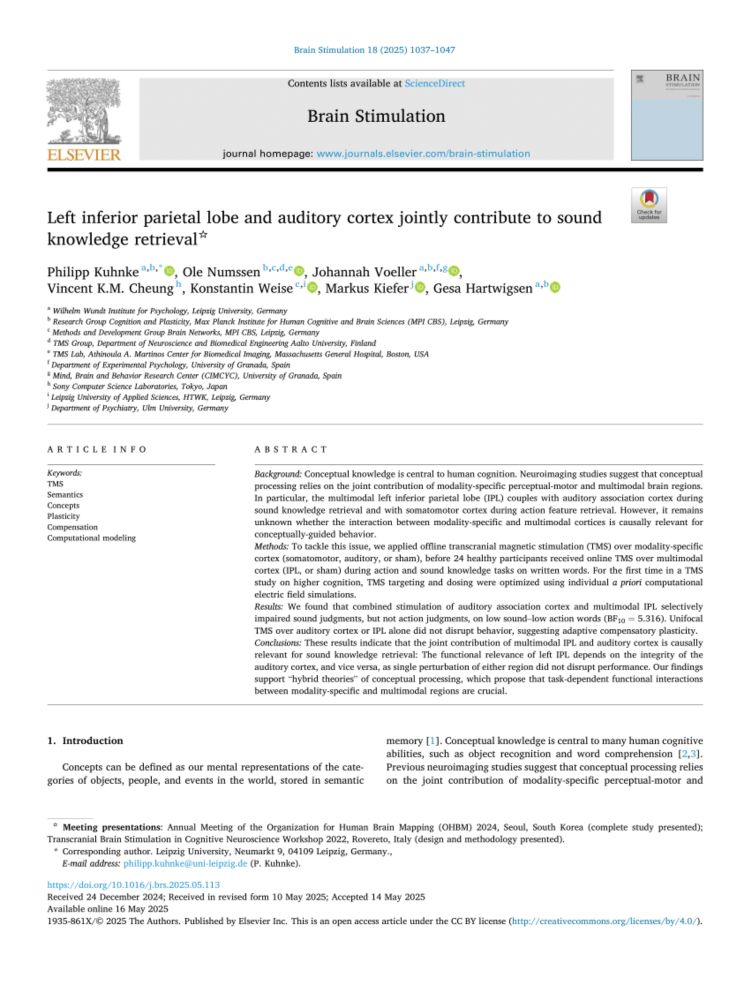Cognition and Plasticity (CoPla) Lab
@copla.bsky.social
310 followers
470 following
13 posts
Research group @mpicbs.bsky.social in Leipzig 🧠 investigating plasticity in cognitive networks 🪢 using neuroimaging (e.g. fMRI) and non-invasive brain stimulation (e.g. TMS).
Posts
Media
Videos
Starter Packs
Reposted by Cognition and Plasticity (CoPla) Lab
Philipp Kuhnke
@philkuhnke.bsky.social
· May 24

(PDF) Left inferior parietal lobe and auditory cortex jointly contribute to sound knowledge retrieval
PDF | Background Conceptual knowledge is central to human cognition. Neuroimaging studies suggest that conceptual processing relies on the joint... | Find, read and cite all the research you need on R...
www.researchgate.net
Reposted by Cognition and Plasticity (CoPla) Lab
Philipp Kuhnke
@philkuhnke.bsky.social
· Apr 24

The ‘reading’ brain: Meta-analytic insight into functional activation during reading in adults
Literacy provides the key to social contacts, education, and employment, and significantly influences well-being and mental health. Summarizing 163 st…
www.sciencedirect.com
Sandra Martin
@drsandramartin.bsky.social
· Apr 23

Causal Contributions of Left Inferior and Medial Frontal Cortex to Semantic and Executive Control
Semantic control guides the targeted and context-based retrieval from semantic memory. The overlap with and dissociation from domain-general executive control in the frontal lobe remains contentious. ...
doi.org
Reposted by Cognition and Plasticity (CoPla) Lab
Sandra Martin
@drsandramartin.bsky.social
· Apr 23

Causal Contributions of Left Inferior and Medial Frontal Cortex to Semantic and Executive Control
Semantic control guides the targeted and context-based retrieval from semantic memory. The overlap with and dissociation from domain-general executive control in the frontal lobe remains contentious. ...
doi.org
Reposted by Cognition and Plasticity (CoPla) Lab
Reposted by Cognition and Plasticity (CoPla) Lab
Philipp Kuhnke
@philkuhnke.bsky.social
· Feb 21

New insights into the mechanisms of language recovery after stroke
A new study shows how the brain reorganises itself in the first few months after a stroke to improve the ability to speak again. The findings will help researchers understand how functional networks w...
www.uni-leipzig.de
Reposted by Cognition and Plasticity (CoPla) Lab
Reposted by Cognition and Plasticity (CoPla) Lab
Philipp Kuhnke
@philkuhnke.bsky.social
· Jan 22
Left Inferior Parietal Lobe and Auditory Cortex Jointly Contribute to Sound Knowledge Retrieval
BackgroundConceptual knowledge is central to human cognition. Neuroimaging studies suggest that conceptual processing relies on the joint contribution of modali
ssrn.com
Reposted by Cognition and Plasticity (CoPla) Lab
Philipp Kuhnke
@philkuhnke.bsky.social
· Jan 22
Left Inferior Parietal Lobe and Auditory Cortex Jointly Contribute to Sound Knowledge Retrieval
BackgroundConceptual knowledge is central to human cognition. Neuroimaging studies suggest that conceptual processing relies on the joint contribution of modali
ssrn.com
Reposted by Cognition and Plasticity (CoPla) Lab






